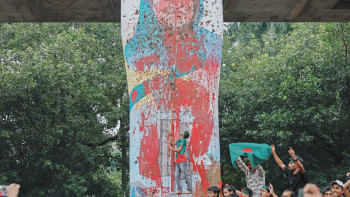After the euphoria, the concerns

The young people of the country deserve to be congratulated, their heroism celebrated, and their momentous accomplishments acknowledged. Their dedication, bravery and sacrifices to free the country from a deeply unpopular regime justly earned them the affection, admiration and gratitude of the people.
However, the pace and abruptness of these unprecedented developments must give us pause. After all, the actual movement and the fall of the regime occurred within only one month of turmoil and bloodshed. Moreover, the political and psychological legacy left by the previous regime heightens some concerns.
First and foremost, some resentments and frustrations of the people that had accumulated over several years, some sentiments of revenge and retribution among those who had suffered injustice, and some opportunists simply taking advantage of a fluid situation, have all led to various incidents of violence and vandalism. While some of this is expected, it must be resisted.
This lawlessness is particularly worrisome since some people have ransacked government (read people's) properties, destroyed revered historical markers relating to our Liberation War, and attacked minority communities simply because they are vulnerable. Given the fact that the police themselves remain discredited and demoralised, such crowd gangsterism becomes a self-fulfilling prophecy and invites disaster.
Even though people like Gustave Le Bon, Sigmund Freud, Nobel Laureate Elias Canetti and others have studied the psychology of mob behaviour, the phenomenon remains unclear. There are theories of deindividuation when people supposedly lose their sense of individual identity, personal responsibility or moral authority; of people demonstrating "bystander effects" that attract random participants by appealing to their sense of enhanced power; of people responding to simplistic, exaggerated and overly sentimental rhetoric, signs and codes; or of people becoming emboldened to do what they can get away with in the culture of impunity typically associated with the fall of an autocrat.
These groups must be calmed and contained as soon as possible, or it will become progressively difficult to do so later. It is uplifting to witness courageous and committed young people volunteering to combat such sinister forces and protect public order and minority communities. The worst seems to be over. But the anxieties persist, made sharper in the age of social media, AI bots, and deep fakes. One hopes, like Lincoln, that "the better angels of our nature" will prevail. But let us not forget that he himself was killed.
The problems Bangladesh faces today are surely daunting. But an incredible opportunity has been created to build a more democratic, just and beautiful country. The youngsters have fulfilled their responsibilities. Will the elders find the moral clarity, economic foresight and political courage to fulfil theirs?
Second, the rapidity and drama with which the situation unfolded made it impossible for any "day after" scenarios to emerge. There was no time or opportunity to develop any ideals, programmes, goals, or a clear direction forward. So, the situation remains fraught and fragile. This becomes more problematic in the moral vacuum, personal distrust and social erosion that resulted from years of misrule and mischief, and the hyper-polarised political environment that had been created.
Moreover, the very idea of "politics" had been devalued and mangled by successive regimes. The classical notion of "politics" was built around concepts of public service, the common good, and the people's welfare. But in Bangladesh it had become a sport (the word "khela" had been routinely used) in which cynical, cunning and self-serving people desperately and shamelessly pursued the acquisition of personal profit and power.
Additionally, the guardrails that protect democracy, such as independent judiciaries, robust parliamentary oppositions, vigilant media houses, lively civil society platforms, or autonomous institutions of higher education had all been overwhelmed, finessed out of existence, or serially threatened and undermined.
Similarly, political parties that exist are not based on policies, ideologies, or democratic practices. They merely represent some patron-clientelist configurations where some sycophantic and opportunistic followers cluster around a "leader" who demands a cultish reverence (which is often shown in extravagant and comical ways).
The two organised parties which had held power in the past are burdened by their own history of bad governance, electoral abuses, violence against opponents (including assassination attempts and farcical cover-ups like Joj Miah), ethical lapses, constitutional tinkering, endemic corruption, and nepotistic family control. Other parties are shadowy and limited in their organisation and appeal. The consequent political vacuum in the country looks like an abyss staring back at us.
Even the "deep state" in Bangladesh has been debilitated by inefficiency, bribery and political patronage. Access to almost all government services (which are people's rights) as well as the regular functioning of the economy, became contingent upon payments to syndicates, power brokers and toll collectors, and navigating through serpentine and costly procedures and paperwork.
The economy, suffering from inequality, inflation, unemployment, low forex reserves, and a banking sector in shambles, was turned into a vast kleptocracy of the lumpen-bourgeoisie and their bureaucratic enablers. It embraced the principles of predatory capitalism and concentrated on maximising aggregate indicators of growth and undertaking some dazzling megaprojects, while disregarding quality-of-life indicators such as human rights, civil liberties, ecological conservation, economic justice, gender equity, and public safety. To reset directions and craft policies that would prioritise the interests of the people would be a complex undertaking.
Third, the previous regime is down, but not out. They may lie low for the time being, some may have fled, some arrested, some may announce retirement. But they are still there. The fact that so many of their followers are armed, are used to violence and, unlike most other parties, have a mass basis, makes their presence more ominous.
However, while we condemn their behaviour that brought us to this sad situation, that party's role in our national movement for independence and, particularly, the charismatic presence of Bangabandhu in that struggle, cannot be dismissed or minimised. One must demonstrate some maturity and objectivity in separating his inspiring leadership at that critical juncture in our national history from his obvious missteps and misjudgements later.
Along the same lines, weaponising "muktijuddher chetona," the hawking of "official" narratives by claiming exclusive partisan ownership over the war (even pitting freedom fighters against the people e.g., through "quotas") and interjecting the hateful word "Razakar" during the current unrest, were all crude and cruel interventions. However, the war itself, and the artefacts and relics of that glorious period of our national history, must not be tarnished but appreciated, preserved and studied (hopefully by scholars and researchers and not slogan-mongering party hacks).
Finally, the "India factor" lurks around the corner. There is no doubt that India deserves our respect and gratitude for its actions and sacrifices in our Liberation War. It had harboured millions of our refugees, hosted our government in exile, provided weapons and training to our freedom fighters, offered critical diplomatic support and, eventually, fought a war with Pakistan in which 3,843 of its soldiers were killed and 9,851 wounded.
The initial relationship was predictably rosy but soured later. Many bilateral issues (such as trade barriers, market access, illegal immigration, borders, water sharing, etc) could all be resolved if good faith negotiations between equals had been pursued. However, India's patronising attitudes and the insensitivity to the interests and demands of Bangladesh increasingly forced the latter to look weak and dependent. In popular perception, India turned from a "good neighbour" into a "neighbourhood bully."
The relationship became more complicated through the unleashing of communal forces in India through the ascent of proto-fascist forces pursuing a Hindutva agenda of supremacy and intolerance which led to systematic assaults on India's Muslim history and heritage, as well as the rights and practices of minorities. This would affect the people of Bangladesh as well.
Finally, India left the impression that it was more interested in cultivating a relationship with a particular "party" than with the sovereign country that international law and norms dictate. This politicised its role and compromised its neutrality. And since that "party" stands discredited in Bangladesh today, and its leader has found protection in India, the situation becomes murkier yet.
The problems Bangladesh faces today are surely daunting. But an incredible opportunity has been created to build a more democratic, just and beautiful country. The youngsters have fulfilled their responsibilities. Will the elders find the moral clarity, economic foresight and political courage to fulfil theirs? The nation wishes them success and waits in hope and prayers.
Dr Ahrar Ahmad is professor emeritus at Black Hills State University in the US, and director general of Gyantapas Abdur Razzaq Foundation in Dhaka.
Views expressed in this article are the author's own.
Follow The Daily Star Opinion on Facebook for the latest opinions, commentaries and analyses by experts and professionals. To contribute your article or letter to The Daily Star Opinion, see our guideline for submission.

 For all latest news, follow The Daily Star's Google News channel.
For all latest news, follow The Daily Star's Google News channel. 













Comments